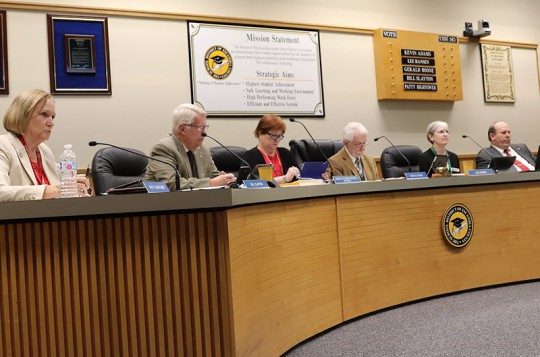Poll: Florida Voters Back School Board Term Limits
March 14, 2018
A proposed constitutional amendment that would impose eight-year term limits on members of county school boards would pass comfortably if it goes on the November ballot, according to a new poll.
The poll, released Tuesday by the Tallahassee-based firm Clearview Research, shows that 68 percent of voters support limiting school-board members to two four-year terms. The Florida Constitution Revision Commission is looking at placing the issue on this year’s general-election ballot.
“The eight-year term limits (proposal) for school board members begins in relatively safe territory for two reasons. First, it begins with 68 percent support and second it is an easy and clear concept for voters to understand,” Steve Vancore, president of Clearview Research, said in comments accompanying the poll results.
The Constitution Revision Commission meets every 20 years and has the power to directly place proposed constitutional amendments on the November ballot. Vancore’s firm polled 750 likely voters on a series of issues being considered by the commission, which is expected to finalize a list of ballot proposals this spring.
The proposal to place term limits on school-board members, offered by Constitution Revision Commission member Erika Donalds, has drawn widespread attention — and objections from groups such as the Florida School Boards Association and the League of Women Voters of Florida.
“This proposal would apply to only one group among several similar groups of local elected officials,” the school boards association said in a document on its website. “It seems discriminatory and punitive to single out one group to be subjected to these conditions and limitations that are not applied equally to all similar groups.”
Nevertheless, term limits — which were approved in 1992 for members of the state Legislature — have been popular with voters. The poll results released Tuesday indicate that 68 percent of voters would “definitely” or “probably” vote for school-board term limits, while only 25 percent would “definitely” or “probably” vote no.
Constitutional amendments require 60 percent approval to pass.
Clearview Research conducted the poll from March 1 through last Wednesday, with the results having a margin of error of 3.58 percentage points. The firm on Tuesday released the results of three questions about proposed constitutional amendments.
While the term-limits proposal received broad support, voters appear unlikely to approve another high-profile proposal that would lift a ban on state money being used to support churches and other religious groups — what is commonly known as the “no aid” provision of the Constitution.
The no-aid provision, for example, has become an issue in debates about school vouchers. The 1st District Court of Appeal in 2004 cited the provision in striking down a voucher program that paid for children to go to religious schools, though the Florida Supreme Court later found the program unconstitutional on other grounds.
The poll indicated only 41 percent of voters said they “definitely” or “probably” would support a proposed constitutional amendment to remove the no-aid provision from the Constitution, while 51 percent said they definitely or probably would not.
Vancore acknowledged difficulty in wording the poll question to come up with a “neutral and accurate” description of the proposal and consulted with an election attorney, Glenn Burhans, about wording issues. But Vancore said the firm decided to stick closely with the way the proposed constitutional amendment is worded.
“With that we are comfortable with the language as it accurately describes the actual impact and, as such, (the proposal) begins in a very poor position with a majority (51 percent) voting ‘no’ and only 41 percent indicating a ‘yes’ vote,” Vancore said in the written comments. “As worded, this item would have virtually no chance of attaining the 60 percent threshold.”
The other results released Tuesday dealt with a proposed constitutional amendment to change the state’s primary-election system and end what is widely described as the “write-in loophole.”
Under current law, all voters, regardless of affiliation, are able to vote in primaries if the candidates are from one party. For example, if a race draws only two Republican candidates, the primary would be open to Democratic and unaffiliated voters.
But when a write-in candidate enters the race, it closes the primary. For example, two Republicans and a write-in candidate in a race would mean that only Republican voters can cast ballots in the primary, effectively shutting out Democrats and unaffiliated voters.
The proposed constitutional amendment would end the ability of write-in candidates to close primaries. The poll found that 58 percent of voters support the idea, while 26 percent oppose it. Vancore pointed, however, to the complex language of the ballot proposal and said that whether it would pass is “anyone’s guess at this time.”
by Jim Sanders, The News Service of Florida
Comments
2 Responses to “Poll: Florida Voters Back School Board Term Limits”




If you find someone who is competent, make sure he can only stay in for a short time so he can be replaced with someone who may or may not be clueless.
It is interesting how we as voters have so little confidence in us as voters that we want to limit ourselves from voting in our best interest and the best interest of our children.
David for competent voters and public servants
Why stop there. How about limits for Tallahassee and while we’re at it limits in DC would be nice instead of the career criminals we have now. Really want to fix it? Repeal the 17th amendment and give states back their representation as our founders originally designed our government Then again that would be asking politicians to do what’s right for those they “represent” instead of what will get them re-elected. Just a thought